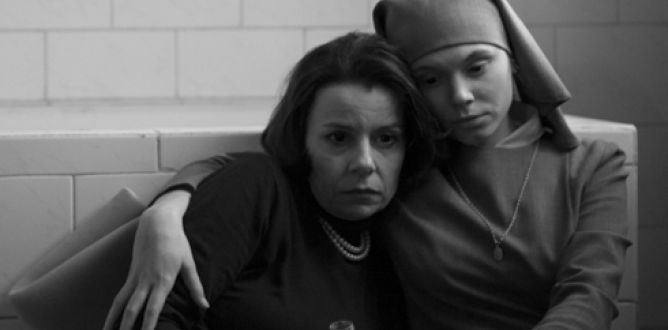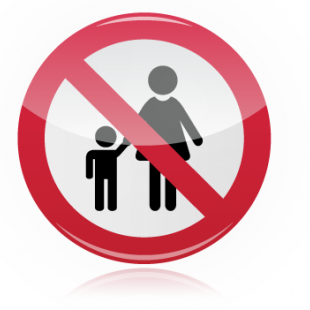Ida Parent Guide
What's in a name?
Parent Movie Review
The only life Anna (Agata Trzebuchowska) has ever known has been lived within the walls of a convent. Placed there as an orphaned child during the early 1940’s, she was raised by nuns who are now her only friends and role models. So it is little wonder she has decide to join the Sisters and take her vows.
It isn’t until she is called into the office of the Mother Superior (Halina Skoczynska) that the eighteen-year-old novice learns she has a living relative—one who has never chosen to make contact with her before. Sounding more like a command than a request, Anna is told to meet with her Aunt Wanda (Agata Kulesza) and learn about her past before she commits to a future of poverty, chastity, and obedience.
Dressed in her traditional habit, and leaving her cloistered security behind, Anna arrives in the big city at her aunt’s apartment in time to see what appears to be a lover leaving after spending the night. The introduction between the two women is cold, and Wanda gives no indication as to why she has suddenly initiated a reunion. However, she does impart some brief and surprising information: Anna’s name is actually Ida. She is the daughter of Wanda’s sister, who died with other family members shortly after Germany invaded Poland in 1939. And all of them are Jewish.
On the surface at least, Anna/Ida placidly accepts this unexpected heritage and suggests a visit to her parents’ grave to pay respect. A jaded and disgusted Wanda only sneers at her. No one knows where they are buried because Jews were just mysteriously disappearing during the Nazi occupation of World War II. Although Wanda seems content to end their conversation with that, she eventually changes her mind and offers to drive her niece to the small town that was the family’s last known residence.
The road trip that ensues is a strained one. Wanda’s worldly ways are in stark opposition to Ida’s shelter existence. While Wanda picks up a handsome hitchhiker (Dawid Ogrodnik) and spends the night drinking at the hotel bar, Ida barely makes eye contact with the young man and retires to her room to read the Bible. As Wanda makes demanding inquires about their lost loved ones, Ida stands silently in her shadow or attempts to disassociate herself from her aunt’s aggressive actions. Still, as the women attempt to exhume the fate of their family, they also begin to uncover secrets about each other, and even to question things they had always buried in acceptance.
This Polish language production lives up to all the clichés of foreign films. It is shot in artsy black and white, with non-traditional framing and a vintage aspect ration (reflective of its 1960s setting). The subtitled dialogue is sparse, as is the musical score (except when a Jazz band is featured). There is the obligatory sex scene (fortunately with carefully obscured nudity). And it has ambiguous ending.
In consequence, Ida will likely only appeal to a small portion of moviegoers. (Viewers who also have some understanding of Polish and World War II history will appreciate it the most.) And perhaps that is just as well. The subject matter, dealing with war atrocities, alcoholism, sexual promiscuity and suicide, is too mature for young audiences anyway. Parents and those with strong religious convictions may also be disappointed when the script seems to imply a person must partake of some forbidden fruit before they can really decide what path they want to follow. (Considering Ida is contemplating giving her whole life to God, her detour seems rather out of keeping with her character, as well as with the societal morals of the depicted time period.)
Yet the production, directed by Pawel Pawlikowski, is visually beautiful and ironically poetic. One the one hand there is a young girl of faith whose world has had its foundations torn out, left to try and piece it back together. On the other is an older, Communist Party member who has built her life around lofty ideals, which have slowly crumbled, collapsed and crushed all she believed in. Their contrasting crisis of identity will leave audiences with a lot to consider as they try to construct their own conclusions about this thoughtful tale.
Directed by Paweł Pawlikowski. Starring Agata Trzebuchowska, Agata Kulesza Dawid Ogrodnik. Running time: 82 minutes. Theatrical release May 2, 2014. Updated July 17, 2017
Ida
Rating & Content Info
Why is Ida rated PG-13? Ida is rated PG-13 by the MPAA for thematic elements, some sexuality and smoking.
Violence: A judge confesses to using her authority to condemn people to death. Accusations of murder are made, including asking about the weapon used. War atrocities against Jews are mentioned and alluded to. A skull is shown, and the existence of other bones implied, when a grave is dug up. A character jumps from a window to commit suicide (no other details are shown). Adults argue and are suspicious of one another.
Sexual Content: Sinful thoughts and sexual desires are briefly discussed.Sexual relationships between unmarried couples are implied, and one couple is shown kissing and then naked (with carefully arranged camera shots that avoid full exposure of private body parts). Wet clothes clinging to a girl’s body revealing her breast.
Language: Infrequent profanities are heard including a scatological slang and a term of deity. A sexual slang term is used.
Alcohol / Drug Use: Characters smoke and drink frequently. It is implied that a character is an alcoholic, and she is often shown inebriated. Drinking and driving is depicted. A drunk driver loses control and the car goes off the road—the driver is later held in jail by police.
Page last updated July 17, 2017
Ida Parents' Guide
More About The Movie: Learn more about the history of Poland during World War II.
From the Official Website: Poland 1962. Anna is a novice, an orphan brought up by nuns in the convent. She has to see Wanda, the only living relative, before she takes her vows. Wanda tells Anna that Anna is Jewish. Both women start a journey not only to find their family tragic story, but who they really are and where they belong. They question their religions and ideas they believed in. Both are trying to go on living but only one of them can.
Talk about the movie with your family…
How has Anna’s upbringing by the sisters contributed to her desire to become a nun? How does learning about her real identity impact that decision? Does knowing her birth parents are of a different race and religion necessarily mean Anna needs to change her plans?How might such a revelation influence you? Would you be curious to try the forbidden fruit of another life style? Or would your faith keep you firmly rooted to your original path?
What has Wanda dedicated her life to? Why has she become less zealous of her ideologies as she has grown older? What things in her past has she chosen to hide or overlook? How has keeping such secrets affected her?
Why do you think Wanda waits so long to contact Ida? Why does she wait until after they are reunited to undertake the journey to find their lost family? What risks do the women incur by asking questions about missing Jews? What could happen to those who might try to provide some answers? What hurts have been felt by both the Jews and Gentiles depicted here?
Home Video
The most recent home video release of Ida movie is September 23, 2014. Here are some details…
Home Video Notes: IdaRelease Date: 23 September 2014
Ida releases to home video (Blu-ray) with the following extras:
- Q & A with the Director Collector's Booklet including writings from Pawel Pawlikowski and Sara Freeman
- Behind the Scenes
- On the Set
Related home video titles:
Also set in Poland, Defiance tells the tale of a group of Jews that attempt to hide from the Nazi occupiers. After WWII, a young man sets out on a journey across the Ukraine to uncover his Jewish family’s past in Everything is Illuminated.




